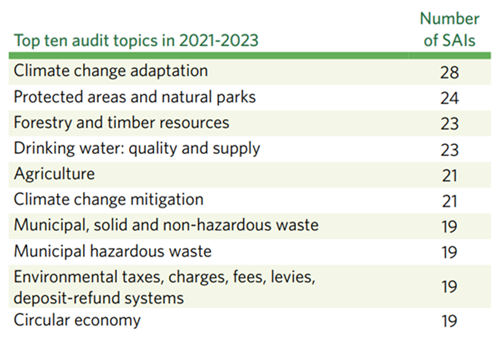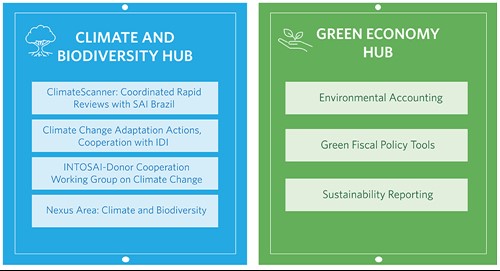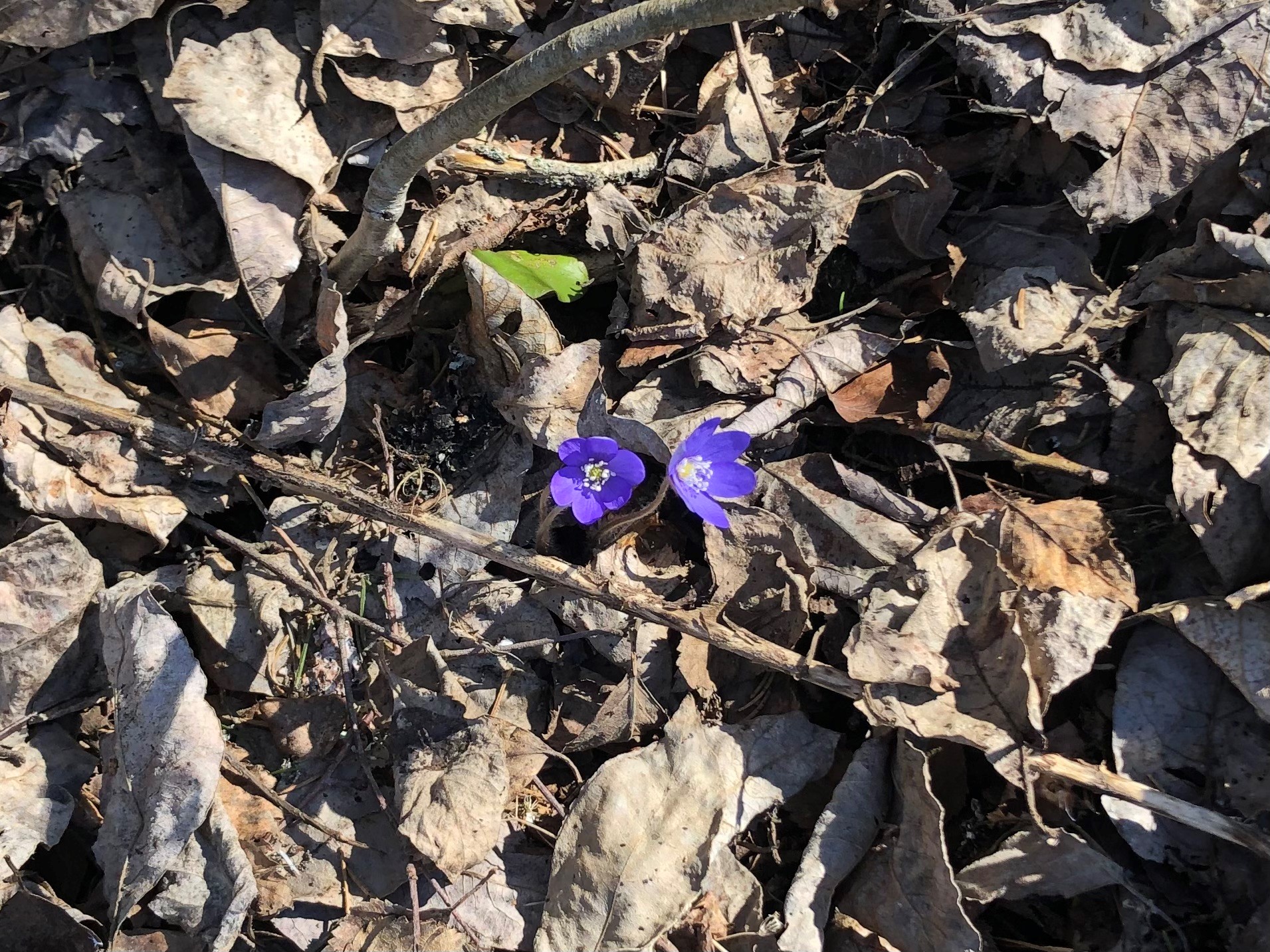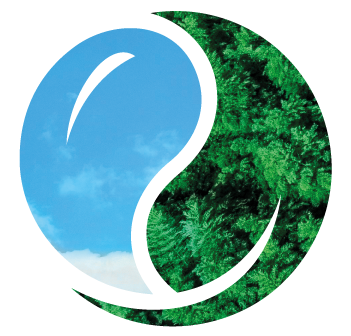WGEA’s new Work Plan reflects the pressing problems of our time
26.04.2023
The INTOSAI Working Group on Environmental Auditing has started to implement a new Work Plan 2023-2025. The Work Plan projects are organised under two thematic hubs: climate and biodiversity, as well as green economy. This blog shines light on problems related to these topics, the new WGEA projects, as well as the process that led to choosing these topics.
When planning the new Work Plan, which initiated in 2021, the WGEA Secretariat sought to continue the 2020-2022 practice of limiting the number of Work Plan topics, to keep the projects manageable and ensure high quality.
The WGEA Secretariat used various resources to collect input for the Work Plan. The main source of information was the 10th environmental survey completed in 2021. Furthermore, the Secretariat initiated a large round of stakeholder discussions with 18 organisations including UN Programmes, World Bank, OECD, regional think tanks and NGOs, to inquire about the current and rising topics as well as SAIs’ role. Finally, the results of the stakeholder discussion and survey were discussed in the future workshop in the 18th Steering Committee meeting in 2021. The Work Plan was adopted in the 21st Assembly in July 2022.
Climate change and biodiversity loss major threats
The global survey, conducted in 2021, shows how SAIs have grown alert to climate change. The number one topic that SAIs planned to audit in the next few years was climate change adaptation. Climate change mitigation also made it to the shared fourth place, whereas three years earlier climate did not appear at all in the top ten list of SAI priorities.

The importance of the climate topic was very much stressed also in the stakeholder discussions. It was considered as the most pressing topic of our lifetime, having severe impacts on economies, societies, and the environment. Many experts also raised biodiversity as a similarly fundamental environmental challenge. One of the key messages was that climate and biodiversity should be approached simultaneously.
The first thematic hub of the Work Plan responds to these needs. It includes a project on a global cooperative audit coordinated by the INTOSAI Development Initiative which the topic focus on adaptation was included in based on the WGEA survey results. Another ongoing collaboration is SAI Brazil’s initiative ClimateScanner aiming at coordinated rapid reviews on climate governance across the countries around the world.
Moreover, the nexus of biodiversity and climate will be studied in the project led by SAI Canada. It also scrutinizes systems thinking, one of the approaches several stakeholders stressed in the discussions. Nexus of biodiversity and climate also continues the WGEA’s work on policy coherence from the previous Work Plan. It also seeks to approach the SDGs as dynamic and interlinked set targets, responding to a certain dissatisfaction of experts as SDGs are too often considered only as isolated targets.

Green economy is the path to success
One of the long-existing frustrations of stakeholders is that governments continue to subsidise the use of fossil fuels, despite the increasingly evident impacts of climate crisis. Such subsidies threaten the effectiveness of supporting net zero targets.
The subsidies as well as other green fiscal policy tools will be the focus in the WGEA thematic hub on green economy and especially in a project led by the European Court of Auditors and SAI USA. That project also helps to reach beyond the environmental sector the departments of finance, energy, and transport. However, the experts also advised to be cautious when planning the subsidies fostering environmental policies. They should be planned very aptly, to be effective.
One of the key challenges in auditors’ work is related to the availability and reliability of data. The project on environmental accounting, led by SAI UK, explores the status of environmental accounting around the world, and seeks collaboration with statistical offices. Reporting on data is also present in the sustainability reporting project, which studies the experiences in the private sector and discusses them in the public sector. This project is co-led by SAIs of Thailand and Indonesia. According to stakeholders, the INTOSAI WGEA could have a role in setting basic requirements for public sector non-financial reporting.
The WGEA will also keep on updating and developing the subject matter specific guidelines in the INTOSAI Framework of Professional Pronouncements, under the leadership of SAI India. The 19th Steering Committee Meeting in March 2023 had an interesting discussion on whether such a guideline should be targeted to environmental auditors, or all auditors in every sector.
Impacts cross borders and reveal injustices
By paying careful attention to the urgent and rising topics, SAIs can be more proactive and pinpoint topics that are of rising importance. Although audit should reflect national circumstances and priorities, global collaboration is often useful in the environmental field, as problems cross borders and there are many attempts to solve them globally. Multilateral environmental agreements, such as the Paris Agreement on climate, can also be a useful source for audit criteria.
Environmental problems and climate crisis embed deep injustices. So called double injustice means that those countries that are the least responsible of emitting the greenhouse gases, tend to face the consequences of changing climate the worst. Moreover, there are also more local injustices affecting those who benefit and those who loose in the green transition differently. It is a challenge for SAIs to stay alert to such injustices, also concerning the spillovers crossing country boarders.
Furthermore, energy transition needs raw materials to supply the renewable energy technologies. There are countries, regions and communities that are left baffled seeing their raw materials mined for the sake of the energy transition, whereas they are left to deal with the consequences. Working across sectors is needed to understand and tackle such problems, also in the long-term.
Strategic principles beyond the Work Plan
To recognize the diversity of SAIs, the WGEA tries to serve both those SAIs conducting their first environmental audits, as well as advanced SAIs. This is one of the WGEA’s strategic principles which were formulated during the Work Plan process. In 2023-2025, especially the collaborative projects give a unique opportunity for beginners to get training and support by engaging in cooperative audits on adaptation in mid-2023 and applying the ClimateScanner methodology in 2024. The planned training by the INTOSAI Donor Cooperation on Climate will also serve this purpose.
The Work Plan also includes many projects for experienced SAIs that have the appetite to develop new innovative environmental audit methods. In the WGEA Secretariat we hope that the Work Plan helps SAIs to conduct influential audits, develop the capacities of SAIs and auditors further, and strengthen the environmental audit community as well as stakeholder relations.
By Vivi Niemenmaa, Secretary General of the INTOSAI WGEA

 Photo: Vivi Niemenmaa
Photo: Vivi Niemenmaa

